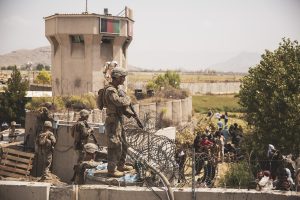On September 9, the U.S. House Foreign Affairs Committee Chairman Micheal McCaul released the committee’s investigation report on the Biden administration’s hasty and haphazard withdrawal from Afghanistan during the summer of 2021. In the report, titled “Willful Blindness,” Republicans in the House of Representatives put the blame on Democratic President Joe Biden’s administration for the chaotic U.S. withdrawal from Afghanistan and the ensuing instability that the country has faced for over three years.
The report, which runs over 200 pages, explains that withdrawal of the U.S. forces is understood to include the longer-term drawdown, which began with Biden’s “Go to Zero” order on April 21, 2021 and culminated with a noncombatant evacuation operation (NEO) order on August 15, 2021. However, the withdrawal culminated in the Abbey Gate terrorist attack on August 26, 2021, in which 13 American servicemembers were killed and another 45 were wounded, along with 170 dead and countless injured Afghan civilians.
On August 30, 2021, the U.S. withdrawal officially concluded when the last American military aircraft left the soil of Afghanistan – thus handing the country back to the Taliban, who had been dethroned from power in the U.S. invasion two decades before.
The House Republicans blame the Biden administration for not prioritizing the security of the U.S. personnel and citizens as well as that of the green card holders and Afghan allies. The report further charges that, despite the opportunity and information, the administration did not take necessary steps to avoid the collapse of the government in Afghanistan. Consequently, the United States had to withdraw haphazardly, without the required personnel, equipment, and supplies, which damaged U.S. credibility and emboldened its enemies.
The report puts all the blame for Washington’s hasty and chaotic exit from Kabul on the Biden administration. However, it fails to recognize that it was Republican President Donald Trump’s administration that signed the Doha Agreement with the Taliban without taking the Afghan government into confidence. The report mentions that the Trump administration maintained 2,500 U.S. troops in Afghanistan, the lowest since the beginning of the war on terror in 2001, due to the Taliban’s failure to fulfill its commitments. But it avoids mentioning that it was the Doha agreement that expedited the fall of Kabul. The Biden administration, in fact, delayed the complete withdrawal of U.S. troops by three months – the Doha agreement had committed to a full and final exit by May 2021.
Regardless of the blame game, it is pertinent to note the timing of the report’s release, two months before the presidential election. Even though McCaul said that the report was not about politics to him, and he would have preferred it to be released earlier, the fact that the report continuously mentions the “Biden-Harris administration” insinuates that it is somehow targeted at both Biden and Vice President Kamala Harris – who is the Democratic Party’s presidential candidate. Notably while eulogizing Trump, who is once again the Republican candidate for president, the report does not mention his then-vice president, Mike Pence.
Additionally, the report digs deep into Biden’s statements when he was vice president in the Obama administration, especially a comment dismissing the protection of women’s rights in Afghanistan, citing then-U.S. Special Representative for Afghanistan and Pakistan Richard Holbrooke’s account of Biden saying, “that’s not what [U.S. soldiers are] there for.” However, the report does not mention that there was no mention of protecting women’s rights in the Doha Agreement, despite the Taliban’s track record of human rights violations in the country during its rule between 1996 and 2001. Overall, the report, despite its facts and evidence, overlooks the blunders of the Trump administration, mainly in regard to the Doha Agreement.
The report’s title, “Willful Blindness,” implies that the Biden administration made a deliberate choice to withdraw from Afghanistan without considering the resultant chaos. However, it does not consider the historic “willful blindness” of past U.S. administrations when it comes to Afghanistan, including the Trump administration.
In his book, “Taliban: A Story of the Afghan Warlords,” Ahmed Rashid wrote that despite its commitment to fight till the last Afghan is left against the forces of the Soviet Union, the United States abandoned Afghanistan after the Soviet withdrawal. Washington took no preparations to feed the hungry people or help bring peace to Afghanistan, which created a vacuum to be filled by the regional powers. Because of Washington’s abandonment, Afghans became deeply bitter toward the United States, which they had fought alongside.
The situation has obvious parallels to the U.S. withdrawal in 2021.
Even back in 2001, when his book was published, Rashid pointed out that the United States had learned little from its previous experience. Due to Washington’s cherry-picked and self-interested policies, Afghanistan has been mired in chaos for five decades. This history clearly shows the “willful blindness” of decades of U.S. policy toward Afghanistan, not just that of the Biden administration.
Despite the report’s criticism of the Biden administration’s ill-managed withdrawal of the U.S. troops from Afghanistan, Washington’s exit, as a matter of fact, was a face-saving act. After decades of fighting in Afghanistan, the Taliban – the enemy against which the United States was fighting – was gaining more control of the country. Therefore, Washington’s only option was to exit Afghanistan while trying to keep some dignity intact.
The withdrawal began with the 2020 Doha Agreement that Trump’s administration signed directly with the Taliban. The Biden administration was left with no choice but to continue the process – which started with President Barack Obama and was boosted by Trump – to mitigate losses and exit Afghanistan.
































